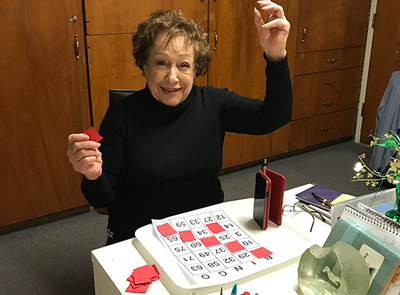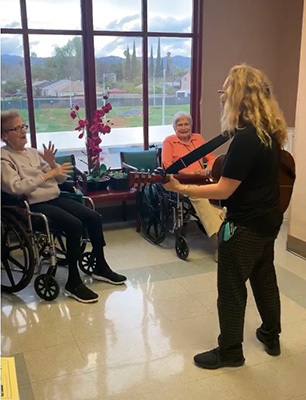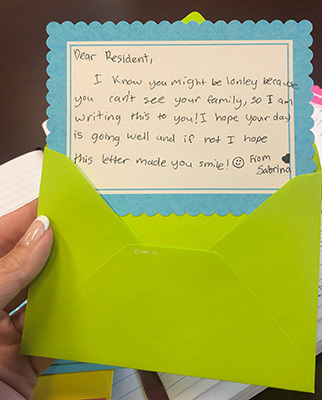Serving the Needs of Our Residents, from Shabbat to Bingo


Serving the Needs of Our Residents, from Shabbat to Bingo

At the Los Angeles Jewish Home, our residents are accustomed to enjoying a wide range of engaging activities on a daily basis. Shabbat services, sing-a-longs and games of Bingo, are all integral parts of the Jewish Home experience.
Now with social distancing in place to slow the spread of COVID-19 (Coronavirus), our staff are coming up with creative ways to engage with our residents to help combat the feelings of isolation.
To "pierce that isolation" and serve the spiritual needs of our residents, Rabbi Karen Bender, the Home's Skirball Director of Spiritual Life, teamed up with Eisenberg Village's Rabbi Ron Goldberg to bring Shabbat services directly to the residents (while keeping a safe six-foot distance apart).
Rabbi Bender led what she calls a "Shabbat serenade" through the hallways at both Joyce Eisenberg-Keefer Medical Center (JEKMC) and the Mark Taper Skilled Nursing Building on Grancell Village. With guitar in hand, Bender appeared on every floor and at the entrance of every room, singing Shabbat songs and wishing residents "Shabbat Shalom!"
"People laughed and smiled and clapped along to the music," Bender said. It took her nearly two hours, but she wanted each resident to know that despite the mandate to remain isolated, none of them is forgotten.

Rabbi Goldberg toured the hallways at Eisenberg Village, accompanied by Volunteer Services Director Stacy Orbach and Lifestyle and Enrichment Director Annette Weinberg, singing songs. "Residents opened their doors as they heard the music," Orbach said. "We sang together, we danced together and we cried together (of course exercising social distancing). I witnessed joy, happiness and gratitude from our residents like never before."
And at Fountainview at Eisenberg Village, Activities Coordinator Lauri Kamiel and Lifestyle and Enrichment Director Carolyn Clark took their "Welcoming Shabbat" show "on the road" to their residents. "From their doorways, we sang Shabbat songs, and said the blessings for the candles, wine and Challah," Kamiel said.
Earlier in the week, Kamiel and Clark toured the hallways with a cart full of board games. They knocked on residents doors and shared some jokes and songs. The duo agreed that one of the highlights came when everyone sang "Tomorrow," from the musical "Annie." "Many residents are familiar with this song and joined us in an uplifting, feel-good moment," Kamiel said.
Staying in Touch
While the Home's Brandman Centers for Senior Care (BCSC), recently closed its day center, in compliance with guidance from California and the City of Los Angeles, the BCSC Clinic and Therapy services will continue to remain open to meet essential healthcare needs.
In the meantime, even though most of the participants, who reside in the local community, are not physically in the BCSC Day Center, BCSC staff are doing everything they can to keep them healthy and well. Staff are calling to check in with participants, sending health care providers out into the community, delivering both meals and supplies to those who need them, and sending care packages to keep participants engaged.
Dial-A-Bingo
If you've spent time at the Eisenberg Village campus, then you know how passionate residents are about their Bingo games. To help fill that void, Weinberg, came up with a solution: Dial-A-Bingo.

Weinberg distributed a flyer detailing the rules with a phone number for interested residents to use if they wanted to play. Then she handed out Bingo cards and colored paper squares to cover the called numbers. Weinberg, along with Orbach and Sandy Schipper, Lifestyle and Enrichment Assistant, phoned the residents and connected them into a conference call. They called the out the numbers, told jokes and kept track of the winners.
"All the residents who have played say it's a lot of fun," according to Weinberg. "They appreciate the effort. Residents are having so much fun that the word is getting out and more and more want to play. We plan to offer this daily during the week."
For resident Audrey Barger, who in normal times, volunteers as one of the Bingo callers on the EV campus, the activity is a welcome break from the daily routine. "Everybody looks forward to Dial-A-Bingo," she says. "It's a great way for us to connect with each other."
Putting Out the Word
To brighten the hours of our residents' days, we've put out the word that they would love to receive cards, pictures or letters! And, families have already responded to the call. If you would like to join the effort, please direct your cards and letters to our Director of Volunteer Services, Stacy Orbach, at our Eisenberg Village Campus at 18855 Victory Blvd, Reseda, CA 91335.